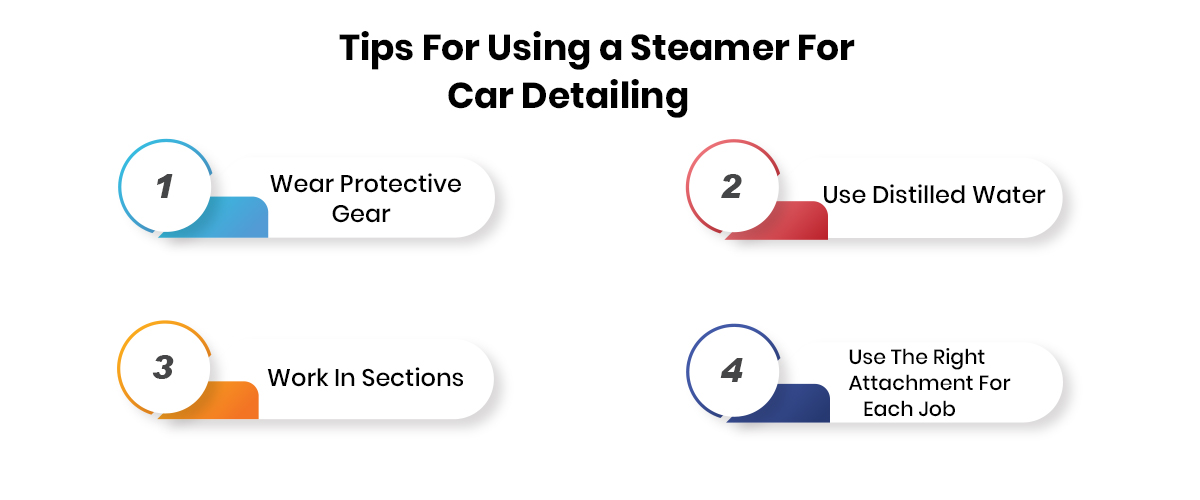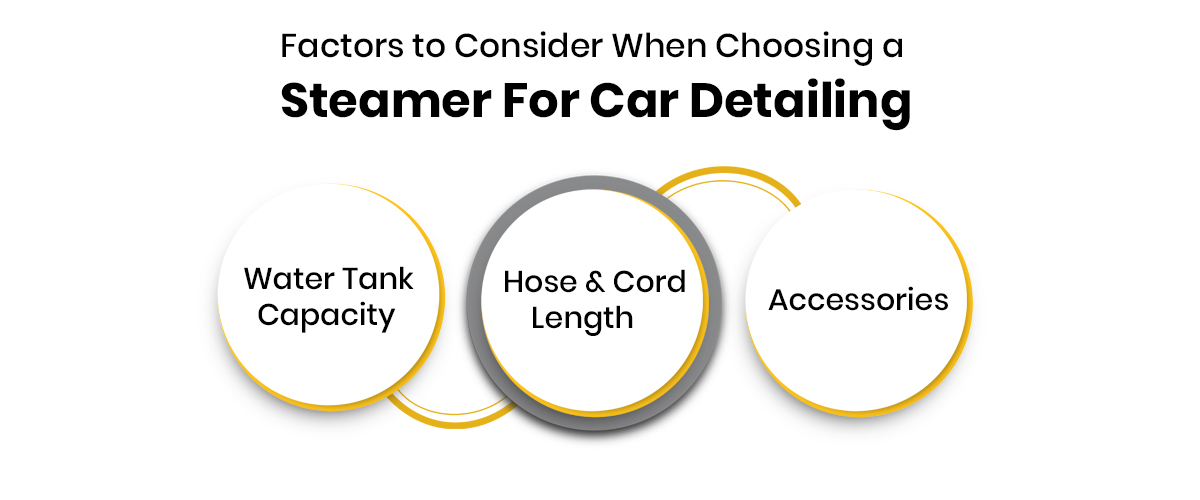Steamer for Car Detailing: The Ultimate Guide

Car detailing is a meticulous process that requires the use of various tools to get the job done right. One of the most versatile and effective tools for car detailing is a steamer. Steamers use high-temperature steam to clean and sanitize different surfaces of your car, including carpets, upholstery, and plastic trims. They are eco-friendly, chemical-free, and can help you achieve a deep clean without damaging the car’s finish.
What is a steamer for car detailing?
A steamer for car detailing is a machine that produces high-temperature steam that is used to clean and sanitize different parts of your car. Steamers use water as the cleaning agent, so they are eco-friendly and chemical-free. They work by heating water in a boiler until it reaches high pressure and temperature, then releasing the steam through a nozzle or brush attachment.
Benefits of using a steamer for car detailing
Steamers use only water, so they don’t produce harmful chemicals or pollutants.
Saves time: Steamers can clean and sanitize different surfaces quickly and effectively.
Versatile: Steamers can be used on different surfaces, including carpets, upholstery, and plastic trims.
Steamers don’t require any chemicals to clean, which makes them safe to use around children and pets.
Deep cleaning: Steamers can reach tight spaces and crevices, which makes them ideal for deep cleaning.
Cost-effective: Although steamers can be expensive initially, they can save you money in the long run since they don’t require any cleaning chemicals or detergents.
Types of steamers for car detailing
There are three main types of steamers for car detailing.and with a vacuum function.
- Handheld steamers
- Canister steamers
- Steam cleaners
Handheld steamers are lightweight, compact, and portable. They are ideal for cleaning small areas such as car seats, floor mats, and door panels. Handheld steamers are also great for quick touch-ups and spot cleaning.
Canister steamers are larger and more powerful than handheld steamers. They come with a variety of attachments and are ideal for cleaning larger areas such as carpets, upholstery,and the engine bay. Canister steamers are also great for cleaning grime, dirt, and stains from various surfaces.
Steam cleaners with a vacuum function
Steam cleaners with a vacuum function are the most advanced type of steamers. They can clean and sanitize surfaces while also vacuuming up any dirt and debris. These steamers are ideal for deep cleaning and are commonly used by professional car detailers.
Tips for using a steamer for car detailing
Here are some tips to help you get the most out of your steamer:

Wear protective gear:
Wear gloves and safety glasses when using a steamer to protect yourself from hot water and steam.Work in sections:
Work on one section of the car at a time to ensure thorough cleaning and prevent the steamer from cooling down.Use distilled water:
Use only distilled water in your steamer to prevent mineral buildup and extend the life of the machine.Use the right attachment for each job:
Different attachments are designed for different cleaning tasks. Use the appropriate attachment for each part of your car.
Factors to consider when choosing a steamer for car detailing
When choosing a steamer for car detailing, there are several factors to consider:
Power and heat-up time
A steamer’s power and heat-up time are crucial for efficient cleaning.
Look for a steamer with a high wattage and short heat-up time for best results.
Water tank capacity
The water tank capacity determines how long you can clean before refilling the steamer. Consider the size of your car and the cleaning tasks you need to perform when choosing a water tank capacity.
Hose and cord length
The hose and cord length of a steamer can affect your mobility and reach. Make sure to choose a steamer with a long enough hose and cord to reach all areas of your car.
Accessories
The accessories that come with a steamer can affect its versatility and efficiency. Look for a steamer with a variety of attachments for different cleaning tasks, such as brushes, nozzles, and extension wands.
How to use a steamer for car detailing
Using a steamer for car detailing is straightforward, but it does require some preparation and care.
Preparing the car
Before using a steamer, make sure to remove any loose dirt and debris from your car’s surfaces. This will prevent the dirt from getting trapped in the steamer’s nozzle or attachments.
Filling the water tank
Fill the steamer’s water tank with distilled water. Never use tap water, as it can contain minerals and impurities that can clog the steamer’s boiler and nozzle.
Starting the steamer
Plug in the steamer and turn it on. Wait for it to heat up and build pressure. Most steamers have a light that indicates when it is ready to use.
Using the steamer on different parts of the car
Start by using the steamer on the exterior of the car. Use a nozzle or brush attachment to remove dirt and grime from the wheels, tires, and undercarriage. Move on to the engine bay and use the steamer to remove grease and oil.
For the interior, use the steamer on carpets, upholstery, and plastic trims. Move the steamer slowly and in a back-and-forth motion to ensure maximum cleaning.
How do you use a steamer for auto detailing?
Using a steamer for auto detailing is a great way to deep clean your vehicle’s interior and exterior. Here are the steps to use a steamer for auto detailing:
You’ll want a steamer that produces high-pressure steam and comes with a variety of attachments, including a nozzle, brush, and extension wand. Look for a steamer that’s designed for automotive use.
Fill the steamer with distilled or deionized water. Avoid using tap water, as it can contain minerals that can damage the steamer over time.
Use the appropriate attachment for the surface you’re cleaning, such as a brush attachment for upholstery or a nozzle attachment for hard surfaces. Hold the steamer a few inches away from the surface and move it back and forth, applying steam as needed.
Wipe away excess moisture:
After steaming, use a microfiber towel to wipe away any excess moisture. This will help prevent water spots and streaks from forming on the surface.
Before using the steamer, you’ll want to pre-clean the surface you’ll be steaming. This will help remove any loose dirt or debris that may be on the surface. Use a vacuum or a soft-bristled brush to remove any loose debris.
Turn on the steamer and let it heat up for a few minutes. Once it’s ready, the steamer will produce a constant flow of steam.
For heavily soiled surfaces, you may need to repeat the steaming process multiple times.
Remember to follow the manufacturer’s instructions for your specific steamer model, and always use caution when working with hot steam.
Conclusion
(Is a steamer good for car detailing?)
Using a steamer for car detailing is a great way to achieve a deep clean without damaging your car’s finish. It is eco-friendly, chemical-free, and can be used on different surfaces. When choosing a steamer.
FAQS
Can I use a steamer on all surfaces of my car?
Is it necessary to use distilled water in a steamer for car detailing?
How often should I clean my car with a steamer?
Can I use a steamer to clean the interior of my car?
Is it safe to use a steamer on the electronic components of my car?
Can I use a steamer on all surfaces of my car?
Is it necessary to use distilled water in a steamer for car detailing?
How often should I clean my car with a steamer?
Can I use a steamer to clean the interior of my car?
Is it safe to use a steamer on the electronic components of my car?

a4AutoTransport is a group of auto transport researchers and experts that comes in handy for anyone who wants to move their car/vehicle without putting extra miles on the odometer. At a4AutoTransport, We researched over a hundred car shipping companies, interviewed real customers and industry leaders, and collected nearly 500 quotes to find the nation’s best auto transport companies. With our combined 5 years of industry experience and research, we’ll help you find the right car shipper for your budget.
